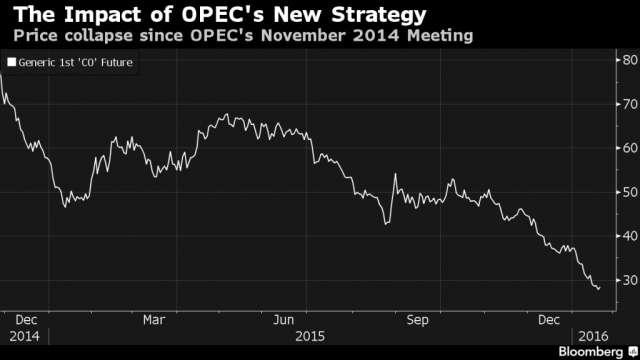
The impact of the continued slide in the price of crude is well known to everyone who has been tracking Nigeria’s economic situation particularly the exchange rate. One thing that has however not been fully acknowledged is the role OPEC (an organisation that Nigeria belongs to) played in all of this. From all accounts, the drop in the price of crude oil is essentially a kamikaze strategy used by OPEC to kill off the competition from shale producers in the US. As the chart above depicts, every time OPEC meets (months of July and November) the price of crude plunges.
OPEC believes that Americans and their shale technology are an existential threat to their very own survival and will rather sustain a price war that will engulf than allow them become the sole victim. At least in a war, either side has a chance of winning or settling for a mutually beneficial arrangement. At each OPEC meeting they meet and decide to continue waging this war with their only weapon being a refusal to cut oil prices. Oil supplies about 40% of the world’s crude oil market and owns over 80% of the worlds proven reserves. As such if OPEC decides to cut production, oil prices will rise.
Wars like this have collateral damage and the first victims are typically those with fewer buffers. Victims also end up being the first to cry which is why countries like Venezuela, Angola and even Nigeria are clamouring for a change in strategy. For example, Nigeria want an emergency OPEC meeting and Saudi Arabia is saying it is not necessary. Saudi believes the common enemy here are the Shale gas producers and rather than back down, they will prefer to be resolute and get other independent producing countries to increase supply or cut back.
For the ordinary Nigerian on the street, this indeed is a battle you have no say about. Your government is equally powerless despite being currently occupying the presidency of OPEC. The continued effect of the war is more job losses, further depreciation of the naira and cuts in budgets from your government, in your offices and your homes. Nigeria can’t increase oil production without sticking to its OPEC quota or decide how much oil prices should be. The consequences are dire and it’s glaring for all to see already. Beyond the CBN, the past government, the present government and other managers of the economy OPEC is the most to blame. The best the current government can do is to erect buffers that can provide help curtail the shocks we are likely to continue to experience for the next few months of not years.









You can not blame OPEC. When the shale oil producers came to the market, they were pumping oil into the market like wastes from a sewage channel and without any care. Profiteering has now turned out to be the nemesis of shale oil producers. They boast of new technology with less cost of production and pumped the oil ceaselessly with the inordinate aim of driving OPEC out of market. It backfired. How do you now expect OPEC to cut its own production to the advantage of shale oil producers when the price war was triggered by the latter. Let the forces of demand and supply decide the winner. Kudos to Saudi Arabia for standing firm. OPEC strategy is the best. Nigeria and other more vulnerable countries should continue to endure as the war will not take 18 months to be over. At the moment, the shale oil producers are really crying and most of them will soon go into bankruptcy. For now, oil sells at less than 30 dollar per barrel and this is less than their cost of production per barrel. When the shale oil producers are starved off the market, the price of oil will rise again. If Nigeria can endure the falling price of oil since mid 2014, the country should endure the fight and shuold stop calling on OPEC to cut production.
I fully agree with Wole, You cannot blame OPEC, as these are what cartels are meant for; Nigeria Government cannot claim ignorance of not been warned about the price war OPEC will wage. So a responsible government would have acted like Joseph counseled the Egyptians what to do with the 7 years of plenty . Even prior to the elections, the then government who was at the top level of OPEC, empowered embezzelment without any solid capital project or economic diversification.
we should do the right thing now and spike a boom in another viable sector, rather then look for stringent ways of impoverishing the mases and even discouraging banking with stamp duties, a wise country who looks forward to having a strong monetary policy and control, will be looking for ways to bring all funds into the banking sector and more of its population bankable, instead of using this sector to fund the budget.
While i agree that many shale operators are going bankrupt, do not ignore the fact that Shale operators are private and they can and will easily resume operations once process rise which will in turn push down prices again. I actually side with the Shale operators as they have been successful in breaking OPECs monopoly in setting oil prices. OPEC will not have the same power over oil process again and that is good for the global economy.
Also I see continued improvements and innovation in unorthodox oil extraction methods such as shale and even clean energy which will continue to impact oil prices
it is unfortunate that Nigeria did not utilize the oil boom to build infrastructure and diversify the economy.